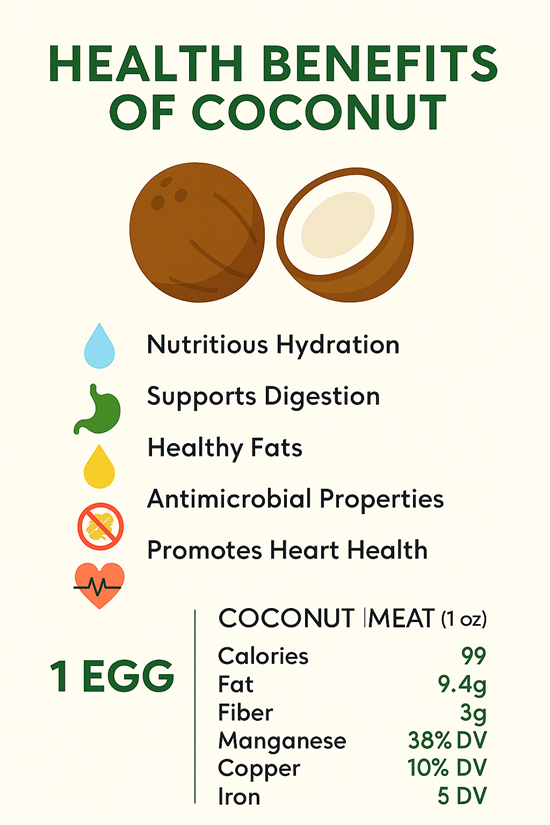Coconut is more than a tropical treat. The fruit’s water, meat, milk, and oil offer distinct nutrients and culinary uses. Research up to 2024 highlights benefits ranging from hydration and digestive support to potential heart-health considerations. Here’s how to use coconut products wisely.
Nutrition Snapshot (per 1 cup)
| Product | Calories | Key nutrients | Notable highlights |
|---|---|---|---|
| Fresh coconut water | 46 kcal | 600 mg potassium, 252 mg sodium, 9 g carbs | Natural electrolytes, low sugar compared with many sports drinks |
| Raw coconut meat (shredded) | 283 kcal | 27 g fat, 7 g fiber, manganese, copper | High in medium-chain triglycerides (MCTs) |
| Canned coconut milk (lite) | 151 kcal | 13 g fat, 2 g protein, iron | Creamy base for soups and curries |
| Coconut oil | 121 kcal (per tablespoon) | 13.5 g fat, largely saturated | Heat-stable for sautéing up to ~350°F (175°C) |
Evidence-Based Benefits
Hydration and Exercise Recovery
Coconut water’s potassium and sodium content supports hydration after moderate workouts. Small studies suggest it rehydrates as effectively as commercial sports drinks for most people, with fewer added sugars. Athletes engaging in intense, long-duration exercise may still need beverages with additional carbohydrates and sodium.
Healthy Fats for Satiety
Coconut meat and milk contain medium-chain triglycerides (MCTs), which the body converts to energy faster than long-chain fats. Some research links MCTs to increased satiety and modest metabolic boosts. However, coconut fats are still saturated—enjoy them as part of a balanced diet with plenty of fruits, vegetables, and unsaturated fats.
Digestive Support
The fiber in coconut meat (around 7 grams per cup) supports digestion and helps maintain regularity. Coconut flour is a gluten-free alternative rich in fiber, ideal for baking and thickening soups.
Antimicrobial Properties
Lauric acid, a fatty acid abundant in coconut oil, converts to monolaurin in the body. Lab studies show monolaurin can disrupt certain bacteria, viruses, and fungi. While promising, these findings are largely laboratory-based—do not rely on coconut oil as a standalone treatment for infections.
How to Use Coconut Products
- Coconut water: Drink chilled after exercise, blend into smoothies, or freeze into ice cubes for iced coffee.
- Fresh coconut meat: Toast for snack topping, shred into granola, or blend into dairy-free desserts.
- Coconut milk: Simmer with curry pastes, add to oatmeal, or whip chilled full-fat milk for vegan desserts.
- Coconut oil: Use refined oil for higher-heat cooking (less coconut flavor) and virgin oil for baking or sautéing.
Potential Downsides and Precautions
- Calorie density: Coconut products are calorie-rich; measure portions if you are monitoring weight.
- Heart health: Saturated fat content can raise LDL cholesterol in some individuals. The American Heart Association recommends limiting saturated fats to 5–6% of daily calories.
- Allergies: Coconut is classified as a tree nut by the FDA, though true coconut allergy is rare. Consult a healthcare provider if you have nut allergies.
- Added sugars: Bottled coconut water and flavored coconut yogurts often include added sugar—read labels carefully.
Smart Shopping Tips
- Choose unsweetened coconut flakes and milk to control sugar intake.
- Look for BPA-free cans or shelf-stable cartons if you consume coconut milk regularly.
- Store unopened coconut water in a cool place and refrigerate after opening; finish within 48 hours.
- Buy whole coconuts with a heavy feel and no cracks—the liquid inside should slosh audibly.
Frequently Asked Questions
Is coconut oil good for weight loss? Coconut oil can support satiety, but it is still a high-calorie fat. Use it to replace less healthful fats, not as an add-on.
Can people with diabetes drink coconut water? In moderation. One cup contains about 9 grams of natural sugar. Factor that into your carbohydrate tracking and choose unsweetened varieties.
What is the difference between coconut cream and milk? Coconut cream has a higher fat content (typically 22% or more) and thicker texture, ideal for desserts. Coconut milk is thinner and works better in soups and curries.
Bottom Line
Coconut products can be a flavorful addition to your diet when consumed mindfully. Rotate them with other nutrient-dense foods, monitor portion sizes, and consult a registered dietitian if you have specific health concerns or dietary restrictions.

